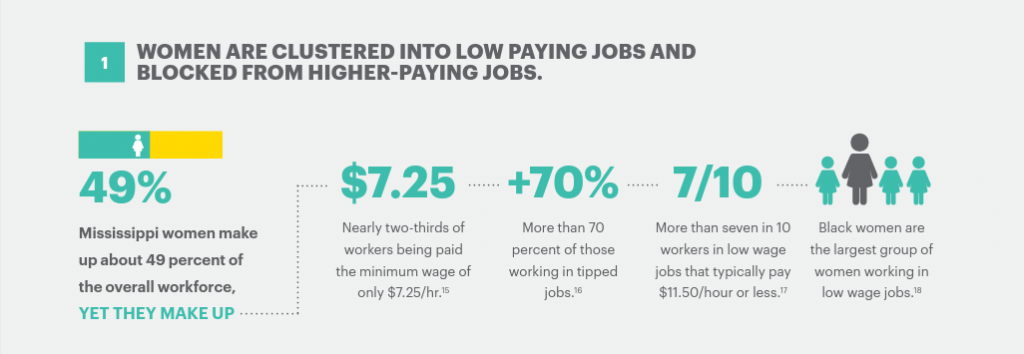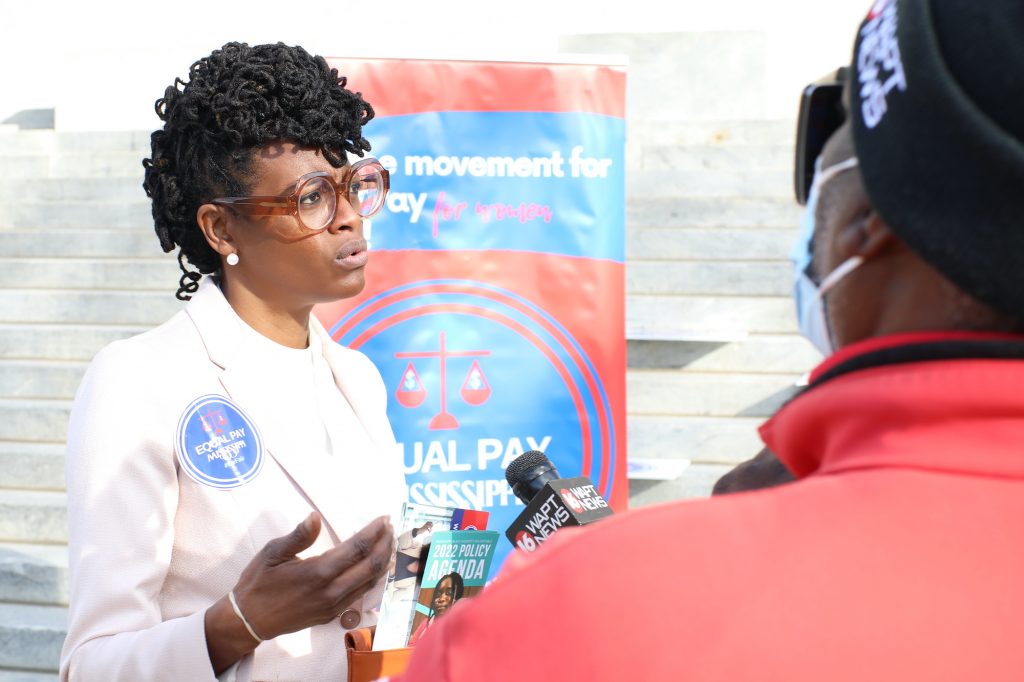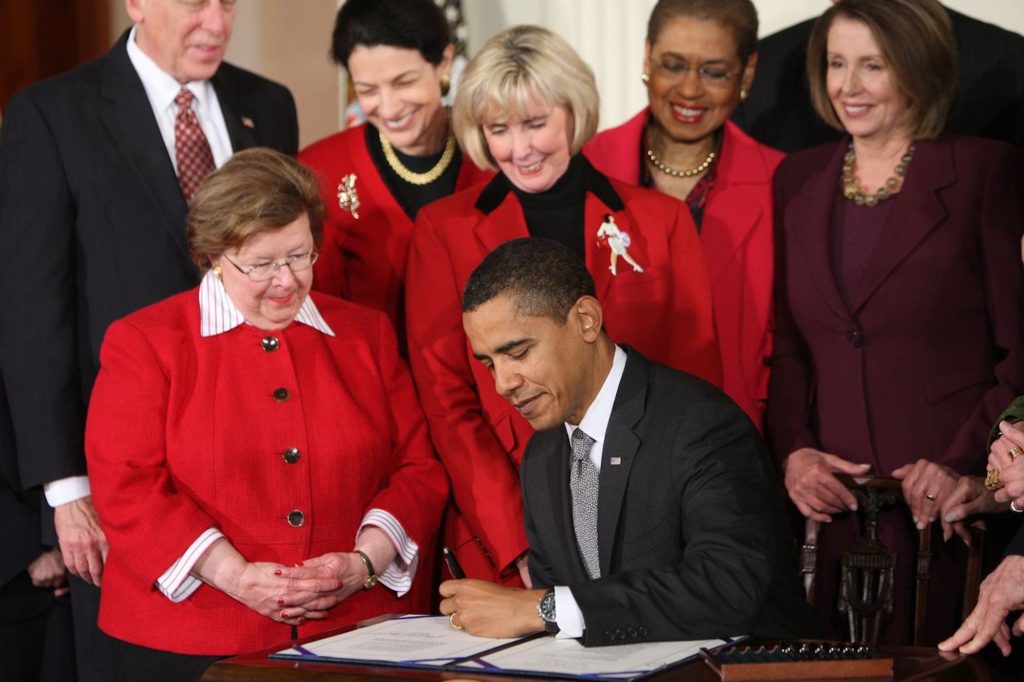Wage disparities could widen for women and women of color in particular if either of two “Equal Pay” bills in the Mississippi Legislature become law, leading activists and experts on the issue are warning.
The Mississippi House passed an equal-pay bill last month, and another one is currently under consideration in the Mississippi Senate, but Mississippi Black Women’s Roundtable State Lead Cassandra Welchlin says both contain provisions that would cause more harm than good when it comes to the gender wage gap.
House Bill 770’s text says that it would prohibit employers from paying “an employee a wage at a rate less than the rate at which an employee of the opposite sex in the same establishment is paid for equal work on a job, the performance of which requires equal skill, effort and responsibility, and which is performed under similar working conditions.”
‘The Opposite of An Equal Pay Bill’
Cassandra Welchlin told the Mississippi Free Press that the pending legislation also writes into law a key practice that causes and perpetuates pay inequalities for women by specifying that employers can base a person’s pay on their salary history.
“It is definitely the opposite of an equal-pay bill in that it rubber stamps an employer’s decision to pay women less for equal work than a man because of her salary history,” Welchlin said. “And so it will codify into law that an employer can discriminate based on what a woman made in the past. For instance, if a woman made $35,000 at one job, $37,000 at another and $40,000 at another, they can say, ‘We’re not going to pay you for this $60,000 job because you haven’t earned your way up to that.’

“But what we know is that when you base a job on a salary history, it keeps a woman from getting what she should have been getting paid because it continues to widen the gap.”
Welchlin said her organization is also concerned that the bill requires women who make claims under the state law to waive their rights to make a claim under the federal equal-pay law. The bill says that “if an employee brings a claim under the Equal Pay Act of 1963, a separate action may not be maintained under this act.”
“The other thing in her bill is that it is based on the ‘continuity of employment history.’ And so what that means is that it would be OK to pay a woman less than a man for the same job because she took time off work to care for her baby or a sick family member, and that’s really concerning for us,” she said. “It’s risen to the top during this pandemic where we see women are the caregivers of the family.”
Bill Allows Types of Pay Discrimination
The text of the bill outlines cases in which an employer can pay women lower, including “a seniority system,” “a merit system,” “a system which measures earnings by quantityy or quality of productions” or “any factor other than sex.”
It specifies that “any factor other than sex” includes “the salary history or continuity of employment demonstrated by the employee as compared to employees of the opposite sex in the same establishment.” It also makes allowances for “the extent to which there was competition with other employers for the employee’s services as compared to employees of the opposite sex in the same establishment” and “the extent to which there was competition with other employers for the employee’s services compared to employees of the opposite sex in the same establishment.”

The House passed the bill on a 114-6 vote on Jan. 20 with support from all Democrats and just six white Republican men voting against it. The bill’s primary sponsor, Rep. Angela Cockerham, I-Magnolia, did not respond to a request for comment for this story, but Welchlin told the Mississippi Free Press that her organization had spoken with the representative about their concerns.
“Mississippi Black Women’s Roundtable and our colleagues have talked with (Cockerham) and told her these provisions will be very harmful to women all across the state and also particularly to Black and Brown women, because Black women make 56 cents on the dollar compared to white men,” Welchlin said. “And so for her to introduce a bill and try to put this into law is really baffling to us when we know Black women aren’t making their full dollar, and it will continue to perpetuate the wage and gender gap.
“We have offered amendments to her that would make the bill better, but she did not take those. … We told her it was really concerning that she would introduce such a bill as this when she knows that Black women are already at risk of wage discrimination, and frankly, all women across this state. And she said we have a difference of opinion.”
The bill defines “employer” to include private employers who “employ five or more employees” as well as “the state or any of its political subdivisions.” An employee must work 40 hours or more to qualify for protection.
‘Both Leave Out Critical Protections’
The other equal-pay bill that the Black Women’s Roundtable is raising concerns about is Senate Bill 2451, which Republican Sens. Brice Wiggins of Pascagoula and Nicole Boyd of Oxford sponsored. Neither Boyd nor Wiggins responded to a request for comment. Welchlin said their bill has issues the House bill does not.
“It offers far fewer protections than already available under federal law. And there’s a couple things that are concerning in this,” she said. “The first thing is that it puts the burden on the woman to have to prove that she is being discriminated against. We’ve never seen that, even talking to some of our national partners. …

“And so what that means is that a woman would have to show that she has been discriminated against and most women don’t know that they’ve been discriminated against. They don’t usually know what her colleagues’ salaries are or how long they’ve been at the job—particularly if a policy is in place that employees can’t discuss their pay.”
Welchlin said the House and Senate bills also share some common problems.
“They both leave out critical protections and language that would actually help close the wage gap. Neither of them have any language about race. Neither one of them has language that would ban an employer from relying on salary history. … Those things are glaring,” she said.
‘A Good Equal Pay Bill’
The Black Women’s Roundtable is not alone in their concerns. In an op-ed the Mississippi Free Press published today, national equal-pay activist Lilly Ledbetter is warning that “these two bills actually risk widening Mississippi’s gender wage gap and stripping Mississippians of their rights.”
Ledbetter was at the center of a 2007 U.S. Supreme Court case in which she challenged the unequal pay she had received while working at a tire plant in Gadsden, Ala., over a nearly two-decade period. But the U.S. Supreme Court ruled that, under federal law, she could have sued only with 180 days of her employers’ decision to pay her at a lower rate—not over each subsequent paycheck.

In 2009, Congress passed and President Barack Obama signed The Lilly Ledbetter Fair Pay Act, which allows workers to challenge all discriminatory paychecks.
“At age 83, I’m living the long-term economic repercussions of unequal pay and employment discrimination that makes my retirement financially challenging,” Ledbetter writes. “I urge Mississippi legislators to swiftly amend these two bills so that all workers in this state can work with dignity and the security of real, meaningful equal pay protections. Mississippians literally cannot afford anything else.”
Ledbetter said she is supporting the Mississippi Black Women’s Roundtable’s efforts to pass “a real equal-pay law that fully protects all Mississippi workers.”
Welchlin said her organization is attempting to get a meeting with Wiggins in order to push for amendments to his and Boyd’s bill. A “good equal pay bill” for Mississippi, she said, must include four components: It must address disparities based not only on gender, but also race; it must ban the use of salary history to determine wages; it must provide protections against retaliation; and it must be enforceable so that women can recover damages.
She said the Mississippi Black Women’s Roundtable had worked with House Rep. Sonya Williams-Barnes and Sen. Angela Turner-Ford on two pieces of legislation that would have achieved those objectives, but both bills died in their respective chambers without a vote. Welchlin’s organization is pushing the Senate to amend S.B. 2451 in order to bring it in line with those earlier efforts, however.
“Women are important to Mississippi’s economy. We are caregivers, we are workers, we are daughters, we are mothers,” she said. “And Mississippi needs to start seeing and treating us as such. And we are also voters. They have got to do what is right so that Mississippi’s families can be economically secure.”


